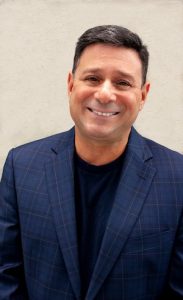 Jay Stein, who is CEO of the hotel brand and management company Dream Hotel Group, says the labor shortage bedeviling the hospitality industry has impacted—but has not halted—the company’s growth, which is including a focused on secondary markets such as the Dallas suburb of Frisco, where it will open Dream Frisco in 2026. This 200-key boutique hotel, he told LODGING at the 44th annual NYU International Hospitality Industry Investment Conference, will be the hospitality center of the 230-acre Firefly Park mixed-use development that will offer guests and locals attractions including a rooftop pool deck and bar, fitness center, and four food and beverage offerings, including a signature restaurant, nightclub, social club, and lobby bar.
Jay Stein, who is CEO of the hotel brand and management company Dream Hotel Group, says the labor shortage bedeviling the hospitality industry has impacted—but has not halted—the company’s growth, which is including a focused on secondary markets such as the Dallas suburb of Frisco, where it will open Dream Frisco in 2026. This 200-key boutique hotel, he told LODGING at the 44th annual NYU International Hospitality Industry Investment Conference, will be the hospitality center of the 230-acre Firefly Park mixed-use development that will offer guests and locals attractions including a rooftop pool deck and bar, fitness center, and four food and beverage offerings, including a signature restaurant, nightclub, social club, and lobby bar.
What is your take on where the hospitality industry is heading?
Between the war in Ukraine, inflation, and the pandemic, it’s hard to say what will happen for sure, so we’re happy to get whatever business we can. Right now, it’s still tough to get into the United States, but I think that will wane when travel restrictions are relaxed.
Although there is pent-up demand for international travel—which is generally more valuable than domestic because those travelers tend to stay longer and spend more than domestic travelers—that business is not yet back; however, this loss is largely offset by a gain in domestic travelers who would otherwise be traveling internationally.
It is my own belief that individual transient business travel will never bounce back to where it was, but it will be balanced by leisure and so-called bleisure, where business travelers extend their trips an extra day or two to work remotely, which they’ve been doing anyway or bring the family while working.
While business travel is not back yet, conferences—which everyone thought would be the last to return—are in fact returning.
What is 2022 looking like for your company?
It was a mixed bag coming out of a pretty strong wave of Omicron at the beginning of the year. I could not have predicted in February that by June we’d be exceeding 2019 levels, as we are in some places. Our Chatwal corporate hotels in New York City had no business travel at all a year ago, but it’s now up to 50-60% percent of what it was, with the remainder made up by bleisure and pure leisure.
Looking ahead, growth is what our company is all about. We are now putting emphasis on middle America, where we see tremendous opportunities. We are already open in Nashville and are building in San Antonio and Atlanta. We have also announced projects in Memphis, Cleveland, and Frisco, a suburb of Dallas, where we will break ground next year on a Dream Hotel in its Firefly Park mixed-use development.
I can name probably another 25 markets where we think it makes sense for Dream to start going—like Austin and southeast markets we’re not yet in like Asheville, Charleston, and Savannah. These are hip places for wealthy people to live and travel. Our hotels provide the opportunity for guests to stay in an exciting, nice hotel that the community is already using for restaurants and bars, pools, and rooftop venues.
Why did you choose Frisco’s Firefly Park in particular for a Dream Hotel?
The Dallas metroplex is a huge area, and Frisco is one of the fastest-growing markets in Texas. We regarded it as the ideal destination to expand our Dream brand there in Firefly Park, which includes 4.75 million square feet of commercial office space, 2,200 luxury residential mid-and-high-rise units along with townhomes, multiple food and beverage offerings, 380,000 square feet of retail space, a planned music hall, and outdoor amphitheater. The project’s public spaces will include a park and nature preserve with miles of hike-and-bike trails, multiple ponds and water features, and several playground facilities.
Has the labor shortage impacted your business or growth?
It’s not affecting growth in terms of getting deals done. However, it does impact our ability to open them initially and keep them open for the full amount of time we’d prefer. The good news is we certainly have enough people to keep them open during the busiest times, like Thursday, Friday, and Saturday nights on the rooftops. Although we’d like to be open on Sunday and Monday, those would naturally be the slower and least profitable nights.
All in all, we are managing through this and other challenges. We are willing to pay our staff more and expect to charge our customers more. This is just a natural progression of what markets do.











